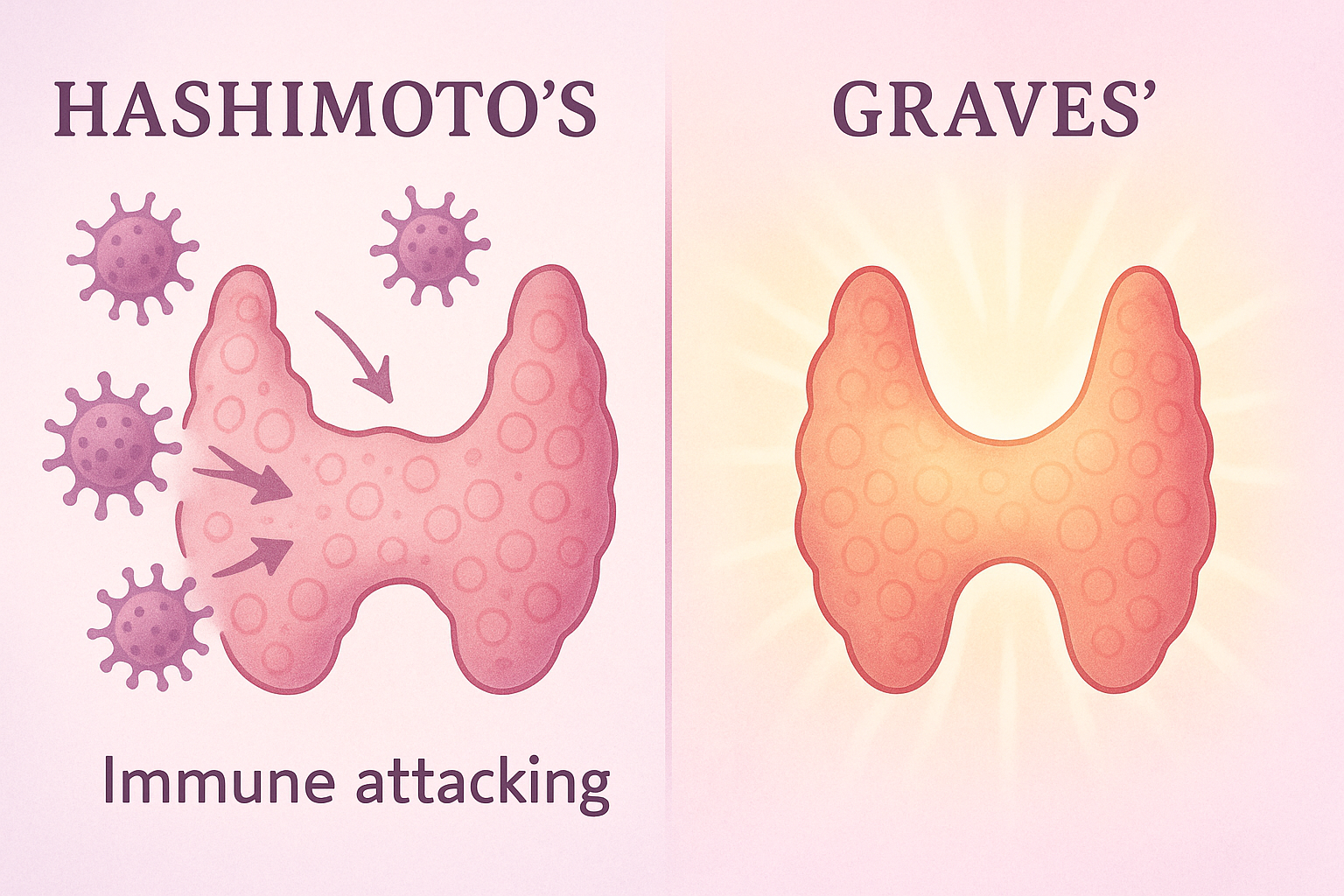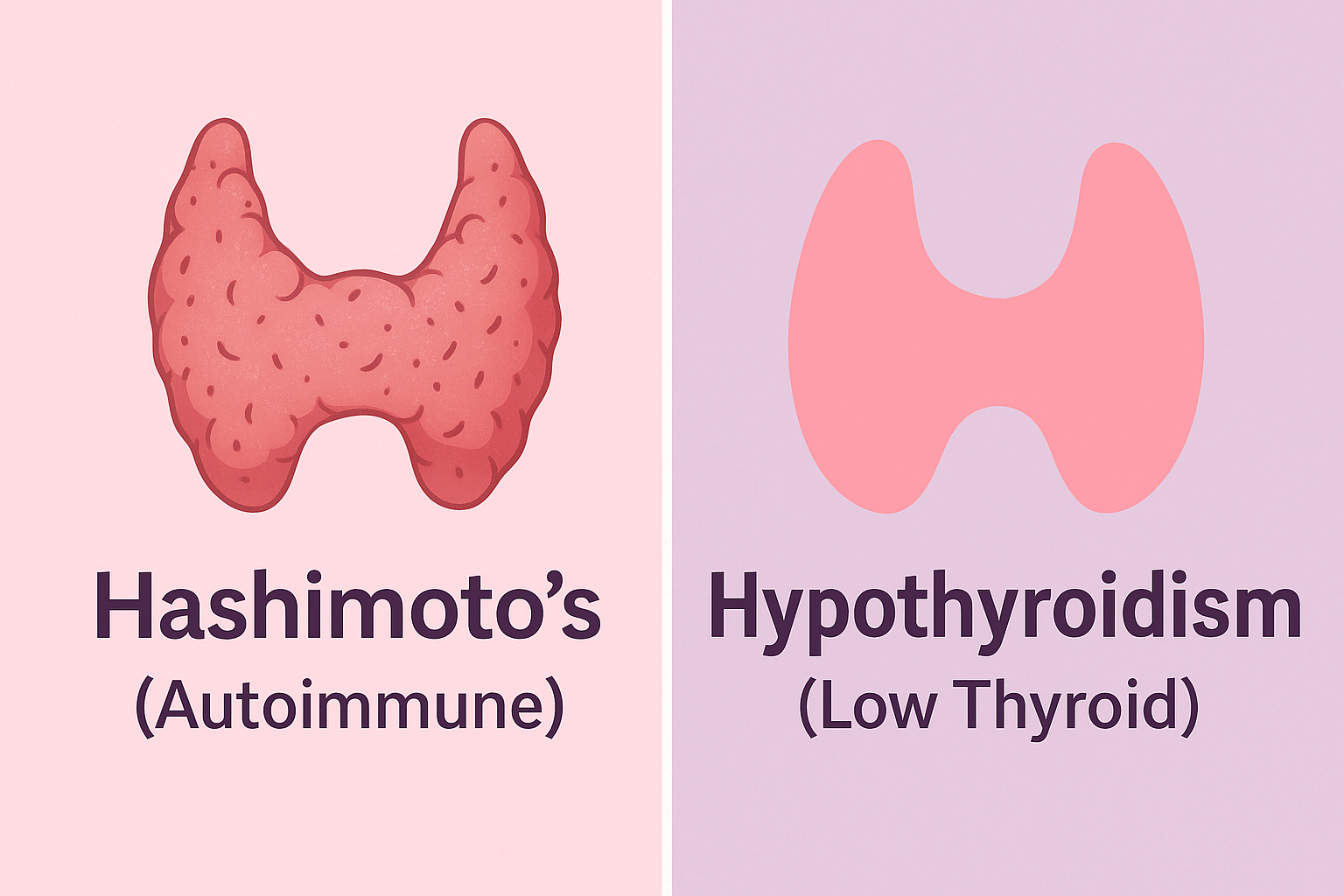Do you often feel anxious, restless, or notice your heart racing — even when you’re sitting still?
You might be experiencing more than stress or caffeine jitters.
For many women, these are subtle clues of an overactive thyroid, a condition where your body is flooded with too many thyroid hormones.
This little butterfly-shaped gland in your neck plays a huge role in your metabolism, heart rate, mood, and even how your skin and hair look. When it’s overactive, everything in your body speeds up — sometimes to a level that feels completely out of control.
The good news? Once you understand what’s happening, you can take simple, natural steps to help your thyroid (and your body) return to balance.
💡 For a complete understanding of how your thyroid works, start with The Complete Guide to Thyroid Health for Women.
🧠 What Is Hyperthyroidism?
Hyperthyroidism — often called an overactive thyroid — happens when your thyroid gland produces too much of the hormones T3 (triiodothyronine) and T4 (thyroxine).
These hormones regulate your metabolism — how quickly your body converts food into energy. When their levels rise too high, your metabolism speeds up, and your body starts running on overdrive.
Women are five to ten times more likely to develop hyperthyroidism than men, especially during hormonal transitions such as pregnancy, postpartum, or menopause.
🩺 On the other hand, if you constantly feel tired, cold, or gain weight easily, check our guide on Signs of an Underactive Thyroid.
⚠️ Common Signs and Symptoms of an Overactive Thyroid
An overactive thyroid doesn’t always scream for attention at first — but it leaves a pattern of clues.
Here are the most common ones women experience:
🔹 1. Unexplained Weight Loss
Even if you’re eating normally — or more than usual — you may lose weight.
Your metabolism is burning calories faster than your body can replace them.
🔹 2. Rapid or Irregular Heartbeat
You may notice your heart pounding or racing even while resting.
Some women describe it as “fluttering” or a sensation of having too much caffeine.
🔹 3. Anxiety, Irritability, or Restlessness
Excess thyroid hormones overstimulate the nervous system, making it difficult to relax or focus.
It can feel like your body is running too fast for your mind to keep up.
🔹 4. Heat Intolerance and Excessive Sweating
You might feel hot when others are comfortable, sweat more easily, or struggle in warm rooms.
This happens because your body’s “thermostat” is turned up too high.
🔹 5. Tremors or Shaky Hands
Fine tremors in your hands or fingers are a classic sign of an overactive thyroid.
They’re caused by the overstimulation of your muscles and nerves.
🔹 6. Difficulty Sleeping
With high levels of thyroid hormones circulating, your body stays in an alert state, making it harder to fall asleep — or stay asleep through the night.
🔹 7. Irregular or Lighter Menstrual Cycles
Thyroid hormones influence your reproductive system.
An overactive thyroid can cause shorter or lighter periods and sometimes missed cycles.
🔹 8. Hair Thinning and Brittle Nails
Excess thyroid activity can accelerate the rate of hair shedding and weaken nails due to nutrient depletion (especially zinc and iron).
If several of these symptoms sound familiar, it’s time to pay attention — your thyroid may be working overtime.
⚡ Learn more about how nutrient deficiencies affect thyroid function in 10 Essential Vitamins and Minerals for a Healthy Thyroid.
🧬 What Causes an Overactive Thyroid?
Several underlying factors can cause hyperthyroidism. Understanding these helps you identify your personal triggers and find balance faster.
🔸 1. Graves’ Disease (Autoimmune Cause)
This is the most common cause of hyperthyroidism in women.
Your immune system mistakenly attacks your thyroid, causing it to produce too many hormones.
🔸 2. Thyroid Nodules
Small lumps or growths on the thyroid gland can sometimes become overactive and release excess hormones independently of the body’s control.
🔸 3. Excessive Iodine Intake
Iodine is essential for thyroid hormone production, but too much — especially from certain supplements or medications — can push the thyroid into overdrive.
🔸 4. Postpartum Thyroiditis
After pregnancy, hormonal fluctuations and immune changes can temporarily inflame the thyroid, leading to hyperthyroidism before eventually slowing down.
🔸 5. Chronic Stress and Adrenal Dysfunction
High cortisol (the stress hormone) keeps the thyroid in a heightened state, pushing your metabolism beyond its natural rhythm.
🌿 Learn more about this powerful connection in How Stress Affects Thyroid Function.
🍎 How to Calm an Overactive Thyroid Naturally
While medical treatment is important for severe cases, many women find that supportive natural approaches help calm the thyroid and restore overall harmony.
🌿 1. Nourish with a Balanced Diet
A thyroid-calming diet focuses on soothing, nutrient-dense foods and avoiding stimulants.
Eat more:
- Leafy greens (magnesium)
- Oats, quinoa, and brown rice (steady energy)
- Berries and citrus (antioxidants)
- Pumpkin seeds and lentils (zinc and iron)
Reduce or avoid:
- Excessive iodine (kelp supplements, iodized salt)
- Caffeine and alcohol
- Processed or high-sugar foods
🥗 See our Thyroid-Friendly Diet for Women for a detailed food plan.
💧 2. Support Hydration and Electrolytes
Overactive metabolism increases fluid loss through sweating.
Drink at least 2 liters of water daily and replenish minerals with coconut water or electrolyte powders.
🧘♀️ 3. Manage Stress Levels
Chronic stress fuels hyperthyroidism.
Gentle yoga, meditation, journaling, and nature walks lower cortisol, allowing your thyroid to return to balance.
💕 Read How Stress Affects Thyroid Function for practical stress-calming techniques.
🌙 4. Prioritize Rest and Recovery
Your thyroid heals best when your nervous system feels safe.
Create a relaxing bedtime ritual — dim lights, no screens, herbal tea, and slow breathing before sleep.
🌼 5. Use Adaptogens for Hormone Harmony
Adaptogens are natural herbs that help the body adapt to stress and regulate hormone output.
Two powerful adaptogens for thyroid balance:
- Ashwagandha – reduces cortisol and supports healthy thyroid function.
- Schisandra – improves resilience, supports liver detox (important for hormone balance), and calms the nervous system.
These herbs don’t overstimulate — they stabilize your thyroid’s rhythm.
🌸 Thyrafemme contains both Ashwagandha and Schisandra, along with 12 essential nutrients for full thyroid support.
🌾 6. Replenish Nutrients Naturally
An overactive thyroid burns through nutrients quickly, leading to deficiencies that make symptoms worse.
The key nutrients to restore include:
- Magnesium – calms the nervous system.
- Selenium – supports hormone conversion.
- Zinc – strengthens hair and immunity.
- Vitamin B12 – improves energy and focus.
🌿 All these nutrients are included in the 14-in-1 formula of Thyrafemme, making daily balance easier.
💊 Thyrafemme — Gentle Daily Support for Thyroid Balance
If your thyroid feels like it’s running the show, Thyrafemme helps bring it back to harmony.
This scientifically formulated supplement blends vitamins, minerals, and adaptogens to support healthy thyroid activity and stress resilience:
Key benefits:
- Encourages balanced hormone production — not over- or underactivity
- Promotes calm, steady energy
- Supports mood and focus
- Nourishes skin, hair, and metabolism
Key ingredients include:
- Iodine (from kelp) — natural, balanced thyroid fuel
- Selenium & Zinc — regulate hormone conversion
- Magnesium & B12 — reduce fatigue and support adrenal health
- Ashwagandha & Schisandra — calm stress and balance the thyroid
Made in an FDA-registered facility, it’s vegan, gluten-free, non-GMO, and stimulant-free.
💕 Read the full Thyrafemme Review: Benefits, Ingredients & Results to learn how it supports women’s hormone balance.
🌙 When to See a Doctor
While natural strategies can make a difference, medical evaluation is important if you experience:
- Rapid or irregular heartbeat
- Unexplained or extreme weight loss
- Severe anxiety or insomnia
- Vision problems or eye bulging
Your doctor can confirm hyperthyroidism with a simple blood test measuring TSH, T3, and T4.
Natural care works best alongside medical guidance — not instead of it.
🌿 Key Takeaways
- Hyperthyroidism occurs when the thyroid produces too much hormone.
- Common signs include anxiety, rapid heartbeat, weight loss, and heat intolerance.
- Stress, excess iodine, and autoimmune conditions are common triggers.
- Natural balance comes from diet, rest, mindfulness, and adaptogenic support.
- A supplement like Thyrafemme can help restore daily calm and balance gently and safely.
🌸 When your thyroid finds its rhythm, so does your life.
Discover Thyrafemme →
❓ FAQ
1️⃣ What is hyperthyroidism?
It’s when your thyroid gland produces too much hormone, causing your metabolism to speed up.
2️⃣ What are early signs of an overactive thyroid?
Weight loss, anxiety, rapid heartbeat, heat intolerance, and shaking hands.
3️⃣ Can stress cause hyperthyroidism?
Yes, chronic stress can overstimulate the thyroid and worsen existing imbalances.
4️⃣ How is hyperthyroidism different from hypothyroidism?
Hyperthyroidism speeds up metabolism, while hypothyroidism slows it down.
5️⃣ What causes an overactive thyroid in women?
Graves’ disease, excessive iodine, thyroid nodules, or postpartum thyroiditis.
6️⃣ Can I calm my thyroid naturally?
Yes, through stress management, nutrient-rich foods, and adaptogens like Ashwagandha and Schisandra.
7️⃣ Which nutrients help balance the thyroid?
Selenium, zinc, magnesium, and B12 help regulate hormone production and calm overstimulation.
8️⃣ Can supplements help?
Yes — natural blends like Thyrafemme provide comprehensive support for thyroid and adrenal balance.
9️⃣ How long does it take to restore balance?
Most women notice improvements within 6–8 weeks of consistent support.
🔟 When should I see a doctor?
If you experience severe anxiety, vision issues, or rapid heartbeat, seek medical care immediately.












